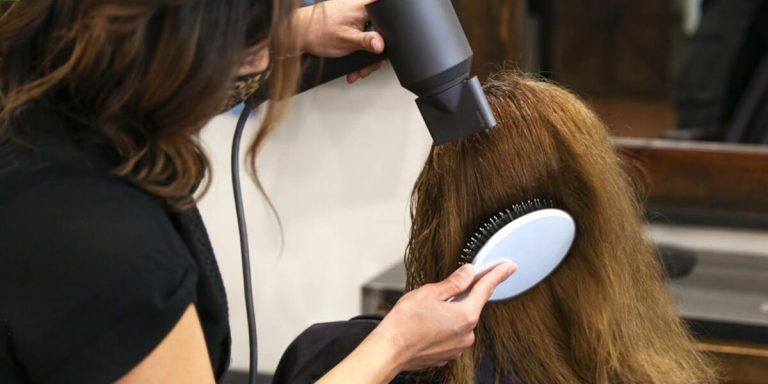Creatine Cause Hair Loss: A Comprehensive Look into the Connection and Evidence
You’ve probably heard the rumor that creatine causes hair loss. It’s a concern floated around gym locker rooms and online fitness forums, often causing worry among those considering supplementing their workouts with this popular performance booster. But is there any truth to it?
Let’s delve deep into the science behind these claims and shed some light on whether or not creatine does indeed contribute to hair loss.
We aim to understand if creatine causes hair loss by examining what creatine is, its effect on your body, especially scalp health and hair growth cycles. We will explore research studies concerning this topic and offer an unbiased analysis based on scientific evidence. Our goal is not just to debunk myths but to provide reliable information for informed wellness decisions.
Did you know?
Despite popular belief, there is no scientific evidence to conclusively prove that creatine directly causes hair loss. Most of the concerns stem from a single study done in 2009 linking increased DHT (Dihydrotestosterone) levels with use of Creatine.
Understanding the Link Between Creatine and Hair Loss
Creatine supplements are widely popular among athletes and fitness enthusiasts for their ability to boost physical performance, muscle growth, and recovery time. However, there’s been a continuous debate on whether creatine might indirectly lead to hair loss as an adverse effect. The association between creatine consumption and hair thinning is based primarily around the theory that it could increase levels of Dihydrotestosterone (DHT), a hormone strongly linked with male pattern baldness.
It is important to clarify though that this link isn’t conclusively proven in scientific studies till date; most claims are anecdotal or based on limited researches. A prominent study often cited was conducted back in 2009 where rugby players who took Creatine showed increased levels of DHT but did not specifically display increased hair loss symptoms over the short term duration of the experiment which prompted caution rather than alarm.
In conclusion, while some believe they’ve experienced accelerated hair fall after consuming these powerful supplements regularly over extended periods, sweeping statements cannot be made due its speculative stance until more diverse long-term clinical trials lend further insight into this matter.
Other possible causes like genetics and lifestyle factors, including stress, play a stronger role in causing hair loss according to evidence from 2023. Despite the uncertainty surrounding creatine’s role in hair loss, concerns may appear overstated currently. Nonetheless, it remains relevant and needs further understanding without overlooking potential risks. High-risk individuals displaying early signs of baldness should pay particular attention to this issue.
Examining Scientific Research on Creatine’s Impact on DHT Levels
Scientific studies suggest a connection between creatine supplementation and hair loss. Specifically, research centers on the assertion that “creatine cause hair loss” by increasing Dihydrotestosterone (DHT) levels in your body.
A groundbreaking study published in 2009 laid the foundation for this debate. The researchers discovered an intriguing increase of around 40% in DHT levels among rugby players consuming creatine supplements during their training period. As DHT is linked to male pattern baldness, it raised questions about a possible correlation between increased consumption of creatine and accelerated hair loss.
However, it’s important to understand that these results are far from conclusive proof stating definitively that ‘creatine causes hair loss’. Many factors can contribute to changes in hormone profiles like DHT such as stress, diet or age itself. Also noteworthy was the sample size – a small group of athletes which may not be representative enough considering widespread usage amongst different demographics globally.
Furthermore, others argue with this premise due to contradictory evidence present within scientific literature questioning whether altered testosterone derivatives could lead directly towards significant follicular damage resulting ultimately into rapid shedding phases more commonly associated with alopecia conditions at first place itself.
Personal Anecdotes: Do Athletes Suffer More Hair Loss?
Throughout the years, countless athletes have reported experiencing increased hair loss. A common factor? Their shared use of creatine supplements.
More than just a coincidence, many believe this is evidence that creatine can cause hair loss in certain individuals.
While it’s not a clinically substantiated link as for yet, there’s enough anecdotal evidence to consider scenarios where an athlete might experience accelerated hair thinning after starting on these supplements. For instance, Jamie was known for his lush head of hair and enjoyed playing contact sports regularly until he started consuming creatine supplements to enhance his performance.
A couple of months down the line; noticeable changes began surfacing — clumps of hair falling out with every shower and visible patches from sustained use over time suggested something wasn’t right. Jamie quit using creatine soon afterward which seemed to slow down his rapidly receding front-line.
Similarly experienced by Heather – a professional swimmer who used energy-enhancing dietary aids like Creatinine only to suffer unprecedented alopecia bouts some weeks later—a trend seen among her teammates too!
All these personal anecdotes suggest people on high-creatine diets seem susceptible to faster-than-normal balding patterns indicative perhaps due to dihydrotestosterone(DHT) increase – already linked scientifically with causing Male Pattern Baldness or MPB primarily.
Factors Contributing to Increased Hair Shedding Besides Creatine Use
The realm of hair loss causes is a broad one, encompassing various factors ranging from genetic predispositions to lifestyle choices and dietary habits. While creatine usage has often been spotlighted in discussions about hair shedding, it’s vital for us not to overlook other contributors that might be exacerbating the situation.
One such factor could be stress levels which are known for their potential adverse impact on our overall health including our hair. Chronically high-stress triggers a response in your body leading to accelerated baldness or thinning of follicles over time. Nowadays, amid the hustle-bustle reality of 2023’s fast-paced life where work-related pressures mount up every day alongside personal emotional strains; this aspect cannot be ignored when battling against premature hair fall.
On another note, poor nutritional intake can also result in increased scalp issues resulting in noticeable shedding. Inadequate protein consumption may prevent adequate keratin production – an essential building block for healthy locks while deficiencies of key vitamins like B12 & D can lead directly towards brittle strands more prone to breakage making your mane look less dense than usual.
Therefore, understanding and addressing these factors parallelly with any controversial supplements like Creatine would provide holistic benefits reducing unnecessary damage fostering healthier environments conducive for solid vibrant growth we all aspire toward ensuring shiny thick tresses adorning our heads turning them into crowns rightly proclaiming reigning glory!
Nutritional Deficiencies That Can Lead to Thinning Tresses
Hair loss is a concern that transcends age and gender, with various factors such as the use of creatine contributing to this issue. However, “creatine cause hair loss” isn’t always the only culprit in accelerating hair shedding process.
An important yet often overlooked contributor includes nutritional deficiencies. That’s right – what you eat can have a direct impact on your mane’s health and thickness!
Iron Deficiency: Iron plays an essential role in producing hemoglobin – a protein required for transporting oxygen in our blood to different parts of our bodies including scalp tissues. A lack of iron can mean less oxygen reaches these areas causing thinning tresses or even bald patches.
Protein Shortage: Hair strands are made up almost entirely from proteins called keratinocytes. Without sufficient dietary intake regular intervals throughout each day, body may not be able produce enough healthy cells support growth ultimately leading rapid shedding thin wispy locks over time.
The Role of Genetics and Hormonal Imbalances in Hair Fall
Genetics is one of the critical factors contributing to hair shedding apart from creatine use. Individuals who have family members suffering from alopecia, or baldness, are more likely to experience similar issues as they grow older.
The primary culprit in genetic-driven hair loss is a hormone called dihydrotestosterone (DHT). This androgen binds with receptors on the scalp follicles leading them to shrink gradually over time. As these follicle sites become smaller, it can lead to thinning of your strands until eventually halting hair production entirely.
Conversely, hormonal imbalances play an equally crucial role in increased hair fall outside of any correlation with creatine cause hair loss. Hormones manage our body’s routine processes; when there is a shift out-of-balance due to problems like thyroid diseases or menopause for women – this could result into excessive shedding.
Beyond that chronic stress triggers high cortisol levels adding further fuel by indirectly causing hormonal imbalance facilitating early onset balding irrespective if you’re male or female.
Protein malnutrition also results often into deficiency related telogen effluvium enhancing unnecessary falling off your precious mane quite prematurely without any connection whatsoever whether does creatine cause hair loss?
Equally so goes for Iron deficiency-induced anaemia which delivers less oxygen needed nutrients towards bodily cells and tissues including those working hard procreating scalp hairs leading again unintended fallout totally unrelated should someone be asking yes but can creatine cause my losing locks!
Addressing Misconceptions About Creatine Use and Balding
Delving into the intricacies of hair loss causes, one cannot ignore the popular claim that has been floating around for years – Creatine use leads to balding. There seems to be a cloud of ambiguity and misconceptions surrounding this postulated relationship. Are they substantiated by scientific research or merely rumors born out of fear?
We’ll address these queries in detail.
Now let’s unpack what creatine really is. It’s an organic compound produced naturally in your body, specifically in your liver and kidneys; it assists with proper cell function and physical performance enhancement especially eradicable during heavy workouts at gyms – hence its popularity among athletes. However, several individuals have expressed apprehension about possible implications on their scalp health ensuing from continuous usage.
Relying heavily on science rather than word-of-mouth scares makes understanding easier, don’t you think? To date, there’s only one widely cited study conducted way back in 2009 arguing a correlation between increased DHT (Dihydrotestosterone) levels – which can potentially induce male pattern baldness – due to consumption of creatine supplements. But remember folks!
Correlation doesn’t equate causation always.
Debunking Myths: Does Every User Experience Similar Side Effects?
The first and foremost myth circling in the health community is that creatine causes hair loss. This misconception stems from a single study published over two decades ago, which suggested there might be an indirect link between increased DHT levels – a hormone thought to contribute to male pattern baldness—and creatine use.
It’s essential to understand that creatine doesn’t cause similar side effects for everyone. Your individual response can depend on several factors:
1- Your genetic predisposition: If you’re genetically prone to losing hair at an early age or if male-pattern baldness runs strong in your family lineage then any supplement may speed up this natural process slightly but does not directly cause it.
2- The dosage of Creatine used: It’s believed higher doses could potentially accelerate the process of thinning for those already predisposed due to genetics.
3- Lifestyle and dietary habits also play crucial roles alongside these supplements.
Moreover, no follow-up research has definitively confirmed those preliminary findings about “creatine cause hair loss”. In fact, most studies conducted on the subject since then have concluded quite the opposite—that regular use of fitness-enhancing supplements like creatine usually don’t result in significant changes with respect to one’s head’s crowning glory!.
Additionally, while some men reported experiencing accelerated receding or thinning after using these products regularly; many others didn’t see any substantial difference even after years of continuous usage!
Correlation Versus Causation: Evaluating Evidence Around Supplement Usage
As we navigate the intricacies of hair loss causes, a question that often surfaces is, “Does creatine cause hair loss?” Let’s delve deeper into this subject to distinguish between correlation and causation when it comes to supplement usage.
Creatine, widely used by athletes for enhanced strength and endurance, has been under scrutiny regarding its potential role in promoting baldness. But before jumping on conclusions based on mere associations or shared characteristics implied by the phrase ‘correlation’, let’s understand what scientific evidence tells us about this connection.
However, it’s critical here not just too narrowly focus on one piece of research with limited scope but also consider numerous other studies indicating no harm caused by Creatine To people without pre-existing scalp conditions.
Conclusion
In the realm of fitness and muscle building, creatine is almost as popular a buzzword as proteins. However, its speculated connection to hair loss remains an area filled with controversies and uncertainties. As our article has demonstrated, some research leans towards “creatine cause hair loss”; however, it isn’t conclusive enough to lay down a blanket statement recognizing creatine solely responsible for your receding hairline.
Don’t fret! Many factors cause hair loss, such as stress levels and genetic predisposition. Before you stop taking your favorite supplement due to the incomplete evidence of ‘creatine causing hair loss,’ consider investigating all possible contributing factors. Explore our website for comprehensive information about the various causes of thinning hair before deciding to eliminate supplements like Creatine from your life entirely.







